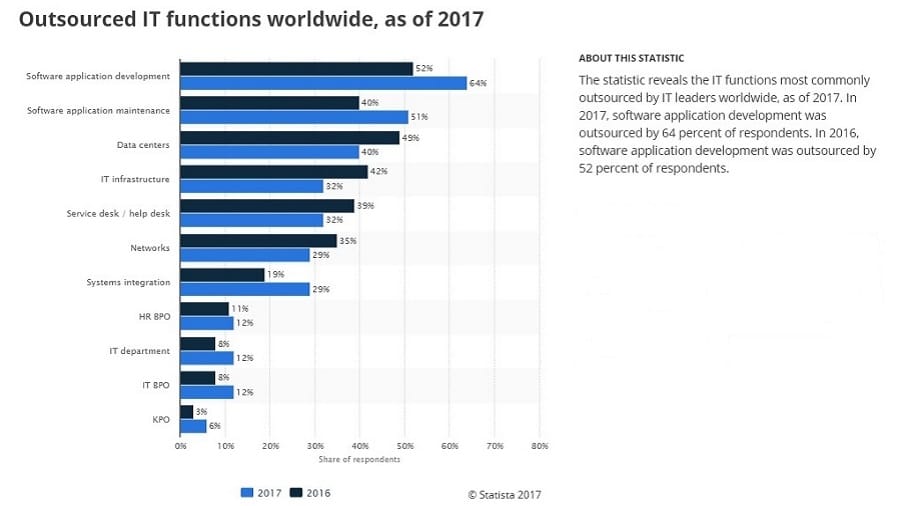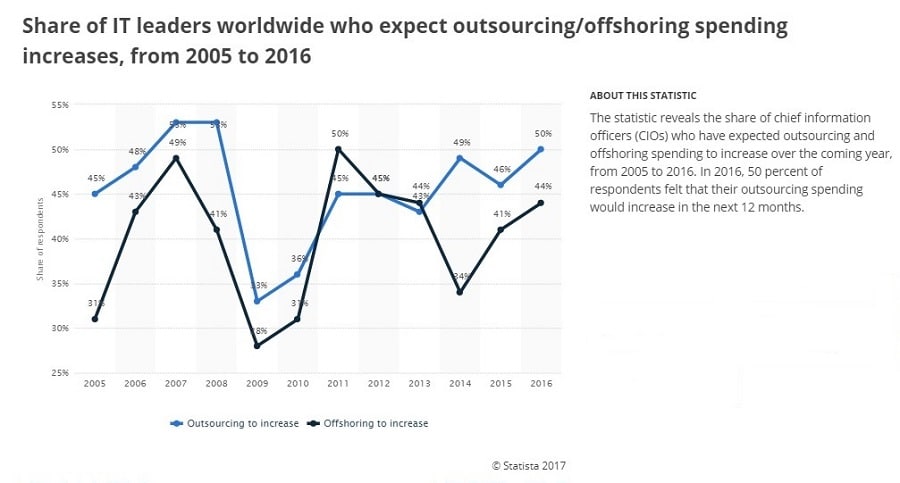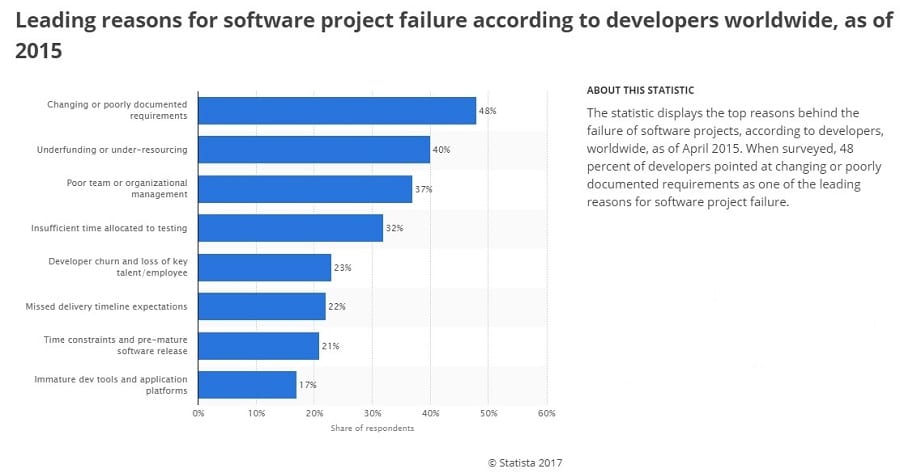Finding a high-quality software developer is hard all over the world. The availability of specific developers such as .NET experts is scarce as the growing number of developers choose to specialize in Java and PHP networks. The average salary of a good .NET developer in regions with high concentration of technology firms is skyrocketing. If you are a startup, it is in fact almost impossible to hire a high-class developer in cities like San Francisco, Seattle, London, or Berlin if you lack backing by a massive VC funding. Time to outsource.
That said, most starting-up companies are forced to outsource a good portion of their .NET development tasks unless their founders or co-founders are .NET developers themselves. The same applies to small and medium enterprises that have to inevitably expand in the cloud or in mobile to remain competitive. In 2016, 52 percent of all outsourced IT tasks worldwide have been related to software application development, a report by Statista says. That number is growing steadily in 2017 with 64 percent of IT leaders admitting they outsource app software development to third parties.
Software application maintenance is ranked second with 51 percent as of 2017, but you should bear in mind that quite often software development services go hand in hand with application maintenance by the same developer. Thus, outsourcing of software development services proves to be the largest IT outsourcing segment.
Adopting Hybrid Approach To Building Internal .NET Teams
[pullquote]Building a great team of .NET developers is getting harder by the day unless you are able to set aside a huge payroll account and have access to latest technologies.[/pullquote] Usually, this is within the reach of large enterprises and multinational corporations that can attract talent and retain them in the long term. And even they experience difficulties retaining their expert IT personnel and developing IT projects entirely in-house. Demand for .NET developers is so high that it is common for good developers to leave high-paying positions to start independent software development companies or tech startups.
Hence, building an entirely in-house software team is more of a dream for small and medium businesses. A viable method is to apply a hybrid approach where you mix in-house development and offshore .NET development services to create a competitive product.
The core idea, the roadmap, and the unique value proposition should be developed in-house in any case. By hiring outsourced developers, however, you can benefit from the exchange of ideas and knowledge and develop your product to the highest standards. Knowledge exchange and use of external expertise is crucial in today’s software development because customers are getting more demanding and competition is fierce. Third-party developers can give you unbiased feedback and point at fundamental weaknesses and strengths of your solution.
For example, experienced agencies such as the .NET development company Itransition or independent teams would provide expert software architects and quality assurance specialists you cannot afford internally. Furthermore, the average business cannot support all kinds of IT staff required to build and maintain a limited number of software products usually developed in-house.
Even when you have .NET developers on your internal IT team, it pays off to work with external developers who bring new skills that your employees will learn in the process of software development and testing.
When Is The Right Moment To Outsource?
You can build a simple application or software platform by hiring a few .NET developers with experience in other languages and development frameworks. A more sophisticated solution, even a complex mobile app, would require a team of 10+ software developers. Managing a team of a dozen developers and iterating a complex software solution is tricky and requires expert knowledge in the respective IT field. So, when the time has come to develop an advanced software solution for internal or public use, you can simplify the process by hiring reliable .NET or other developers. It saves you both time and money while you can cement the outcome by requiring quality assurance and acceptance testing before the final product goes live.
Hiring individual developers one by one to your internal team is actually impossible in the current market conditions. Building a very good team of developers may take years to complete. Hence, the right time to outsource is as soon as you need to create a more sophisticated software for your business to grow. Furthermore, outsourcing gives you the flexibility to scale up and down the entire project depending on changing market conditions, project requirements, and changing demand for your service or product. Essentially, it is always right to outsource a portion of your app development tasks with around half of CIOs across the world saying they expect their outsourcing spending to grow during 2017.
Working Only With Internal Teams Is Risky
Sure, having an internal team of .NET developers means they are well aware of your company values, procedures, and ultimate goals. Nonetheless, a reputable agency or external team of software developers will do their best to familiarise with your company and brand values, long-term goals, and workflow procedures before accepting the job. Thus, you get expert assistance plus a devoted external team to develop your product.
[pullquote]Furthermore, it is hard to retain talented software developers in your team due to a number of factors.[/pullquote] First of all, remuneration is getting ridiculously high especially in developed economies across the world. Second, specialized IT firms can offer more interesting and varied projects to developers. Third, mobility among software developers is on the rise with many IT people, who are experts in less popular frameworks such as .NET, changing jobs on a regular basis. Developer churn and loss of key talent is cited as the main reason for software project failures by about one-fourth of development companies. Finally, poor team management by inexperienced contracting parties causes some 37 percent of all app development failures, according to a survey by Statista.
All of the above factors bear significant risks for any app development project you perform internally. Outsourcing at an early stage is effectively the only way to mitigate these risks and iterate in accordance with your roadmap.
What is more, if your team is relatively inexperienced, which is the most common scenario for small and medium enterprises, it will be hard to prioritize development of key features and designs, thus wasting time on less important functionality or interface components.
For example, what is more important – developing an embedded chat or introducing customisable interactive pricing list? It depends, but an experienced team of developers would know what should be considered a priority feature in your particular case.
Conclusion
Most companies consider IT outsourcing to be a source of innovation, while 59 percent of companies surveyed by Deloitte cite cost-cutting as a major driver for them to outsource. Some 57 percent of respondents say outsourcing enables them to focus on their core business and about one-third admit they outsource to enhance service quality and get access to intellectual capital.
None of the above outsourcing drivers is time-sensitive, i.e. hiring an external team of .NET developers at any stage will produce the cited benefits in the vast majority of possible software development scenarios. Nonetheless, you should be aware that not all scenarios are equal so you need to develop your own strategy for outsourcing software development and app maintenance tasks or projects. A hybrid approach may work for most medium-sized enterprises while small businesses may get best results opting for complete outscoring of their .NET development projects. In any case, you need to have a clear vision of what you want to achieve and pay due diligence to get acceptable results.
For more technology-related articles and information from us here at Bit Rebels, click here!




COMMENTS